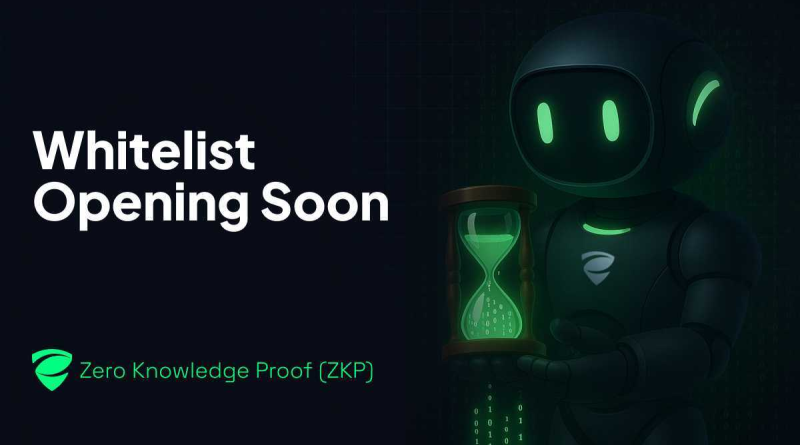Understanding the Foundations of the Zero Knowledge Proof (ZKP) Ecosystem
The increasing dependence on artificial intelligence has created a demand for computational systems that can handle complex workloads while maintaining efficiency, privacy, and security. Centralized infrastructures are struggling to meet this demand, often forcing trade-offs between performance, scalability, and data protection. The growing need for frameworks that can distribute computational workloads securely has pushed the focus toward decentralized solutions that promote trust and transparency.

Zero-Knowledge Proof (ZKP) is an upcoming crypto project designed to redefine how AI computation operates within a decentralized environment. Built around privacy-first computation and verifiable intelligence, it introduces a unique approach to distributed AI processing. With a whitelist prelaunch on the horizon, Zero Knowledge Proof (ZKP) has already gained attention among analysts following the next presale to explode. As anticipation builds, it continues to stand out among crypto presales to watch for its vision of merging AI, privacy, and blockchain in one unified network.
Building a New Model for Distributed AI Compute
At the heart of the Zero Knowledge Proof (ZKP) ecosystem lies its dual consensus mechanism that combines Proof of Intelligence (PoI) and Proof of Space (PoSp). This structure allows AI workloads to be processed across a network of distributed nodes that contribute both computational power and storage capacity. By leveraging these two systems together, the network achieves balance, ensuring that every participant adds measurable value to its operations.
Through Proof of Intelligence, nodes provide verifiable computational capabilities to handle complex AI tasks efficiently. This reduces bottlenecks commonly seen in centralized setups while maintaining the integrity of every process. Proof of Space complements this by ensuring storage reliability through verifiable commitments, enabling decentralized management of data and AI models. Together, the two create a scalable structure where performance and trust work hand in hand.

This merit-based approach also ensures fairness in how participants are rewarded, aligning incentives with contributions. The framework’s structure positions Zero Knowledge Proof (ZKP) as a solution capable of supporting large-scale AI development without compromising privacy or performance. This design has made it one of the most notable crypto presales to watch as attention grows around the whitelist phase coming soon.
Preserving Data Privacy and Intellectual Property
Zero Knowledge Proof (ZKP) introduces a privacy-preserving model that safeguards both user data and proprietary AI models through advanced cryptography. Using zero knowledge proof blockchain technology, it allows computations to take place on encrypted data without revealing the original information. This means users and organizations can participate in collaborative AI development while retaining full control over their intellectual property.
The ecosystem uses zero knowledge proofs such as zk-SNARKs and zk-STARKs to verify that computations have been executed correctly, all without disclosing sensitive data or model details. This process ensures both transparency and confidentiality, allowing for verifiable results while protecting valuable IP. For AI developers, this structure offers a secure environment where research and innovation can progress without risking data exposure or model theft.
As more industries demand privacy-first infrastructure for AI applications, the Zero Knowledge Proof (ZKP) framework aligns well with this global direction. Its ability to combine privacy and verifiable computation has contributed to its recognition among the next presale to explode, particularly among those seeking practical utility in blockchain-based AI projects.
Creating Scalability and Fair Participation
Scalability has long been a challenge in decentralized systems, but the Zero Knowledge Proof (ZKP) ecosystem aims to address it through its modular structure. By allowing off-chain processing and distributed resource management, it ensures that computational demand does not overload the network. This supports continuous growth without sacrificing security or transparency.
The framework also introduces a decentralized marketplace where participants can securely exchange and monetize datasets or AI models. Every transaction in this environment is protected through zero knowledge proofs, ensuring that ownership and authenticity are preserved. This creates an equitable system where contributors of all sizes can benefit, removing the barriers often seen in centralized infrastructures.

Transparency in computation is another defining feature. Zero Knowledge Proof (ZKP) enables AI outputs to be verified through mathematical proofs that confirm accuracy without revealing how results were obtained. This method allows external validation, providing greater trust in results without compromising data privacy. As anticipation builds for its whitelist opening, the project’s approach to verified computation continues to attract attention within discussions about crypto presales to watch.
By promoting both security and accessibility, Zero Knowledge Proof (ZKP) encourages broader participation in decentralized AI development. Its design balances computation and storage contributions across a network that values fairness, efficiency, and verifiability, creating a foundation that could significantly influence future decentralized ecosystems.
Closing Analysis
Zero Knowledge Proof (ZKP) presents a structured and thoughtful response to the challenges of decentralized AI computation. Through its dual consensus model and privacy-preserving architecture, it introduces a framework where efficiency, security, and scalability can coexist. Its approach to verifiable computation and fair participation sets a new precedent for how AI workloads can be managed in decentralized settings.
With its prelaunch phase generating interest and the whitelist coming soon, Zero Knowledge Proof (ZKP) continues to stand out among the next presale to explode. By prioritizing privacy, verifiability, and equitable participation, it positions itself as one of the most anticipated crypto presales to watch this season, laying the groundwork for the next stage in AI and blockchain integration.
Find Out More At:

